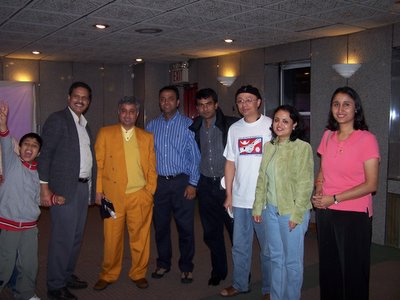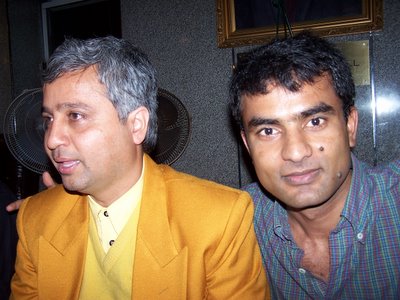

94 photos.
Video clip 1, Video clip 2, Video clip 3.
Krishna Pahadi November 6 Sunday 5 PM
Krishna Pahadi, in his speech in Jackson Heights, said his fight will only end after Nepal becomes a democratic republic. He said he was willing to make any sacrifice for that ultimate goal.
He pointed out there was a major grassroots sentiment in support of his goal, and he has felt it in his travels across the country. He asked the Nepali diaspora to extend its full moral support to the movement in Nepal. His message, speak up for us.
He is also set to speak at New York University Tuesday evening.
The crowd in attendance was as big as the crowd for the seven party gathering. (Seven Party Forum In Jackson Heights)
Pahadi has a very pleasant personality. And he speaks fluently, in a singsong way almost. What he had to say sounded very much like what Gagan Thapa had to say. They both made a clear case for a democratic republic, and both said they are willing to pay the ultimate price for it. (Gagan's Talk In New York)
He wears orange. That is one of his trademark things.
If you showed up early for the program, you got to see the video of the civil society mass gathering in Basantapur, Kathmandu. Then Samudaya showed its own video, which was like the video Aandolan Jari Chha. Then there was poet Parajuli reciting his poems, the video of his program in Kathmandu. I bought a DVD of it. $10. A big chunk of the money goes to the movement in Nepal.
We need to upload all these videos on Google Video. We can charge $1 or $2 per view. That way we reach a larger audience and raise more money. And we plough back that money to produce more videos of the street demonstrations. The more video footage of street demonstrations from Kathmandu and all over Nepal that the global audience sees, quicker will be the resolution. The whole idea is to get hundreds of thousands of people out into the streets so as to sway global opinion. We need to become our own media. We need to put hours and hours of video online. The more the better.
This has to be a movement with zero martyrs. Noone should have to die. Noone died in the orange revolution of Ukraine in 2004. That is also my goal for Nepal. People should not have to die. Not the king, not peaceful demonstrators. Noone. Period.
And you massively reduce the chances of extreme forms of police brutality by showing it all to the global audience.
Many poems were recited.
The program started late.
Pahadi is an amazing speaker. There is this smoothness to both his logic and delivery. As I said, he sounded like an older version of Gagan Thapa.
I told him in person that this movement has produced two heroes: him and Gagan Thapa.
I helped fold up some of the chairs and put them away after the program ended. A bunch of us also had to agree to take home some of the leftover samosas. First I said no. Then I said yes. What the heck, I thought.
My final question to Pahadi was on federalism. He said that is a second step issue. There are still discussions going on if to go for decentralization or outright federalism. He has a right to his viewpoint, but that was an answer I did not like. I feel as strongly about federalism as he does about a republic. But then we settle that issue during the constituent assembly.
And I listened to Deepak "Nepe" Khadka on the train all the way to Penn Station where he got off. There is some kind of a Google group called Nepal Democracy. He has been trying to get me to join the group. It is supposedly a whole bunch of who's who types, like Kul Chandra Gautam and all. But it is a closed group. I think I tried to join, but received no response from the moderator. The frat house is busy and noisy, looks like.
Nepe is a hard core republican. He recited a poem of his own, a gazal. He is a good writer. Nepe is a college classmate of Pahadi, I learned. I told Pahadi I had the same thing going on with Dinesh Prasain, who he addressed as "Dineshji."
We have to push the seven parties for internal reforms, but we can not be hard on them like we need to be hard on the king and the Maoists, especially the king. The seven parties are our political leaders. The seven parties, and the youth represented by Gagan Thapa, and the civil society represented by Krishna Pahadi are all part of the same stream.
This movement has forged an amazing global Nepali solidarity. It is almost like America after 9/11.
I took a whole bunch of pictures.
I am sure the audio clip of Pahadi's speech will be online soon at the Samudaya site.
Ever since I got into town I have been trying to get Dr. Binod Sah of Janakpur to launch the NYC chapter of the ANTA. So far to no avail. Today we realized neither of us have the other's current phone numbers. And today we made some headway. He has invited me to come to his place. It is important to float the ANTA banner in town. Madhesi pride is at stake.
Dr. Tara Niraula teased me about me no longer sending him emails. "Have you taken me off your mailing list?" How could I? It is just that I refrain from emailing people too often. But now Niraula just sent the wrong signal. He is going to start getting a bunch of emails from me.
I have known Mridula Koirala and her husband independent of each other. Today Mridula introduced me to "my husband." And she sang a classic revolutionary song beautifully. I don't think Anil and Sanjaya can sing.
Sanjaya's son was creating a major ruckus, before, during and after the program. He was on the floor right next to where I was sitting. So I took a few pictures for evidence purposes.
Tilak Pokharel of the Kathmandu Post asked me if I recently met Bill Clinton. Answer: yes. "Me too," he said. He said he was going to use his press pass also to meet Amitabh Bachchan in a few days. I tried to talk him into taking me along. He said it was hard enough for him alone. That guy is one step ahead of me.
Anil's wife was part of the walk to the train station. When I said the movement should conclude in a few months, she said I was being optimistic.
Before the program began, I thought I was getting a picture taken with Pahadi, but Pahadi is looking the other way. I have my palm on his shoulder though.
- Krishna Pahadi in NY, part 2 Samudaya.org, AZ
- Krishna Pahadi in DC
Samudaya.org - Nepal Heading For Advanced Democratic System: Pahadi NewsLine Nepal, Nepal
- Krishna Pahadi in Boston Samudaya.org, AZ
- Resist repression: Civil Society Kathmandu Post, Nepal
- Italian citizenship awarded to Pahadi Kantipur Online, Nepal
- Rights activist awarded Italian citizenship Webindia123, India
- Pahadi awarded honorary citizenship by an Italian city Nepalnews.com, Nepal
- Amnesty launch 'Protect the Human' Amnesty International UK, UK
- Rights defenders adopt common strategy on Nepal Kantipur Online, Nepal
- Internal democracy remains an issue within NC Kantipur Online, Nepal
